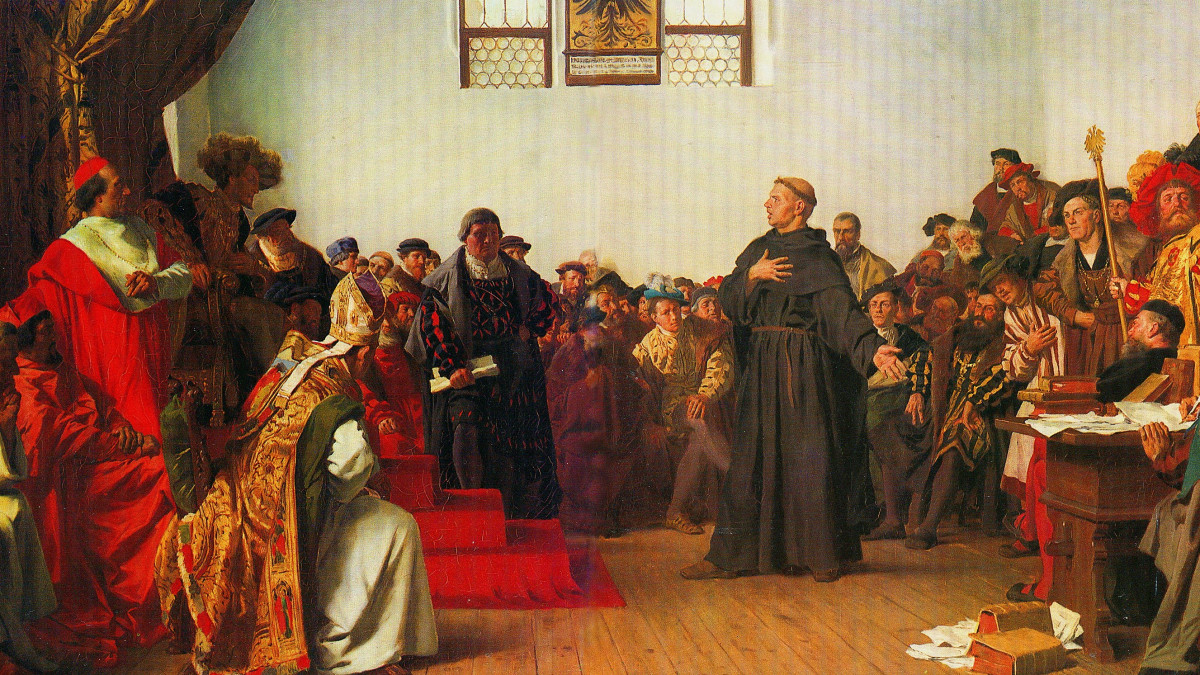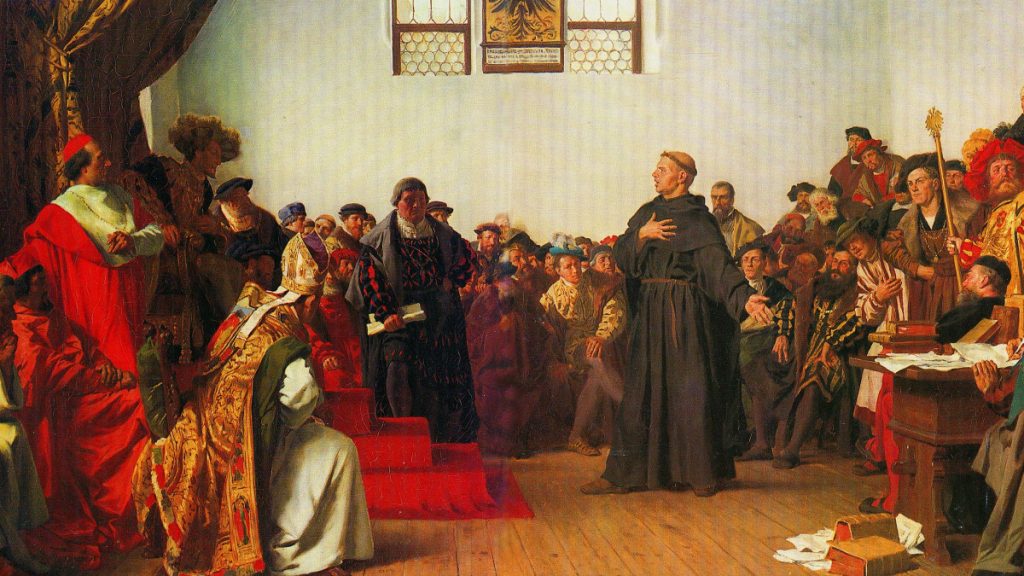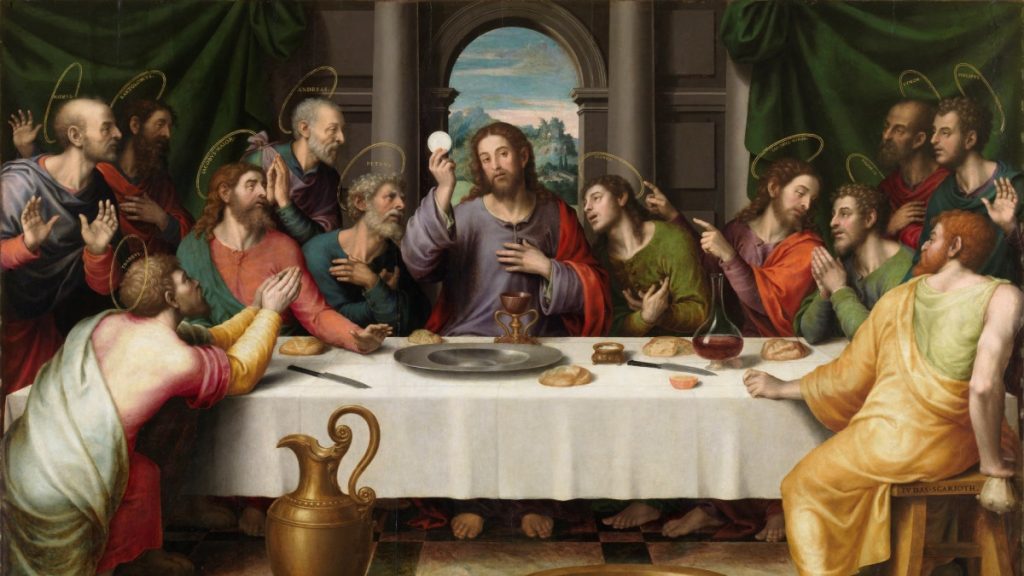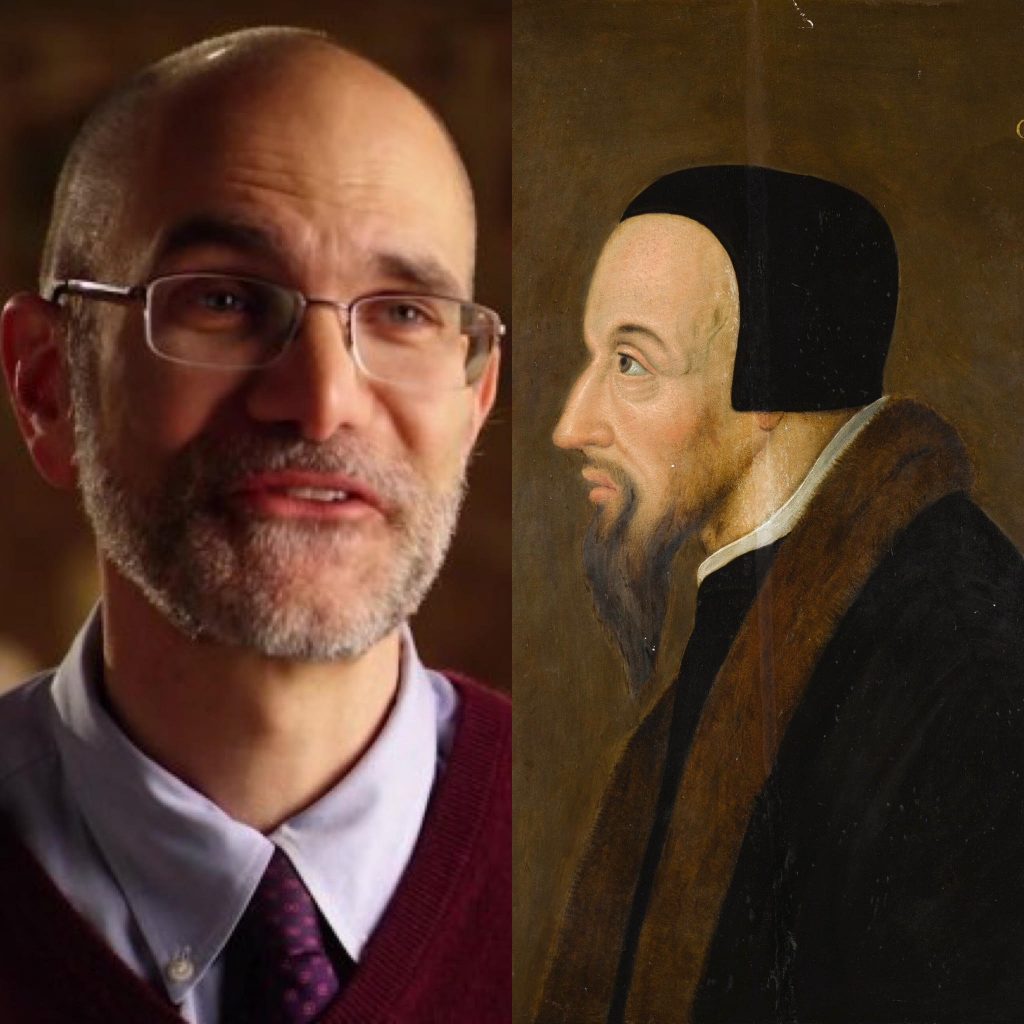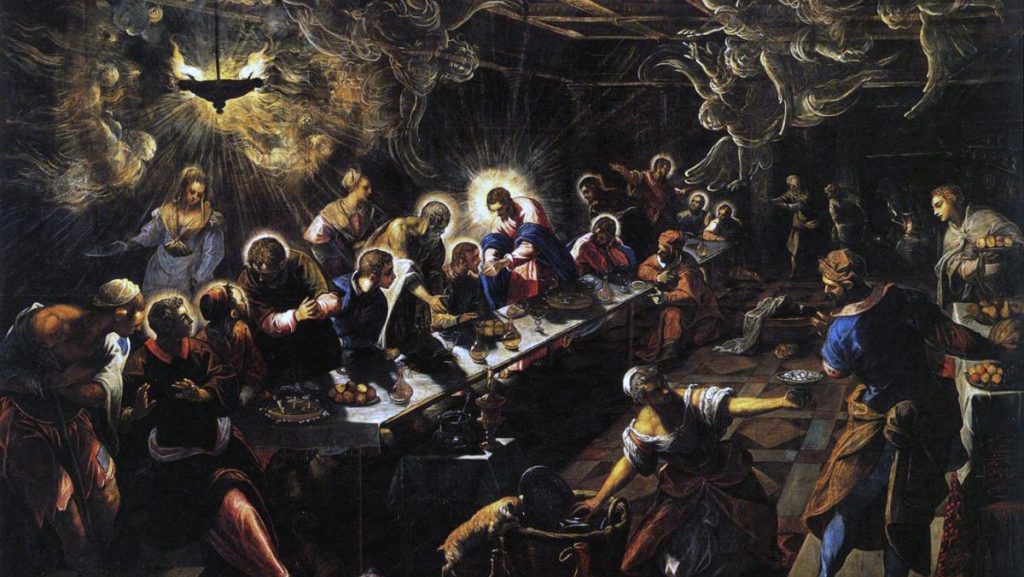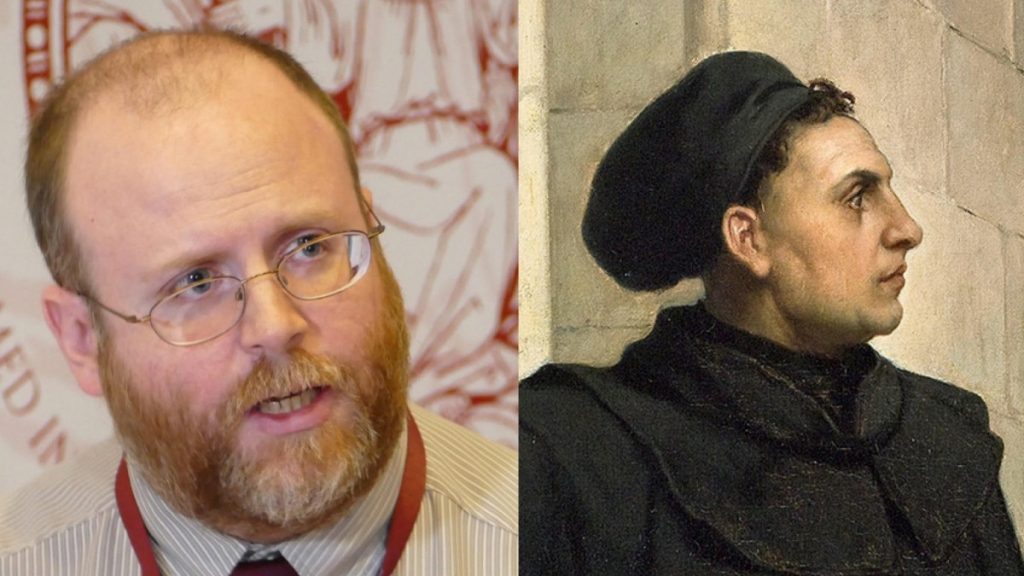Since becoming Catholic, I have sometimes been accused of holding Catholic assumptions, which necessarily lead to Catholic conclusions.
Ironically, this accusation is sometimes made by various protestant acquaintances who know I was raised and lived as a devout protestant for the vast majority of my life, and indeed shared many of those years with me.
The reality, however, is that long before I had read anything by a Catholic author, I had already concluded that certain fundamental ideas held by a majority of protestants (sometimes virtually all) were false. I’d reached these conclusions in two ways:
- Studying Scripture often and carefully; and
- Thinking through the logical and unavoidable implications of my protestant ideas.
Chief among the protestant ideas I concluded were false several years before I began reading the Church Fathers was the doctrine of sola scriptura, or “Scripture alone.” This is perhaps the most famous and fundamental protestant doctrine, and therefore, concluding it was false was quite traumatic. I continued to remain open to the possibility that sola scriptura was true, but at the time, I simply didn’t see how that was possible. Not wanting to disturb the faith of others, I never mentioned my change of mind publicly. I continued to study the issue, and raise it with various learned mentors and friends. Virtually all of them acknowledged I was raising powerful points, and none of them had good answers for them.
This was not only before I became Catholic, but before I had even read a single Catholic author. After my conversion, these various “good points” became—among some of these same protestant acquaintances—“Catholic assumptions.” But of course, this was not so, because I had never been Catholic, never desired to be Catholic, and knew nothing particularly substantive about the Catholic Faith when I reached these conclusions.
Roadmap
With that in mind, our Roadmap is as follows:
- My thesis is that long before reading anything from Catholic sources, I rejected sola scriptura for valid reasons. I will show this by:
- First, correctly defining sola scriptura according to respected protestant sources;
- Second, showing how I concluded sola scriptura was logically incoherent;
- Third, showing why I concluded sola scriptura was inconsistent with the sacred history narrated in Scripture itself (what I call the “logistical” issue);
- Fourth, showing how my intuitions were confirmed by a widely respected protestant figure, R.C. Sproul; and finally
- Summarizing the various questions I had about sola scriptura as a protestant, and how they led me to conclude that sola scriptura was false.
“Scripture Alone”: Getting the Right Definition
Before proceeding my reasons for rejecting sola scriptura, we must first make sure we have a correct definition of sola scriptura.
Over the years, various Catholic apologists have incorrectly defined sola scriptura as the belief that Scripture is the only authority in the Church. However, this is not correct. The doctrine of sola scriptura is the belief that Scripture is the only infallible (meaning, without error) authority in the Church. Various protestant sects leave room for human reason, interpretation, and their own historic creeds, but assert that Scripture alone is infallible by its very nature.
A quick note: for the purpose of this article, I will use the word “infallible” in the sense I understood it as a protestant at the time, which was “without error.” The definition of “infallible” in Catholic theology is more precise: it is a gift granted by Our Lord to His Church that confers an exemption or immunity from error upon the authority of the Church in its formal teachings on faith and morals. As such, “infallibility” in Catholic theology is a feature of only living authorities.
With this clarification in mind, let us proceed.
While I was never a “reformed” protestant (which refers to various forms of Calvinism and Presbyterianism, etc.), I nonetheless acknowledged that the reformed tradition was among the more intellectually rigorous in protestantism. So when dealing with my doubts about sola scriptura, I mostly drew on reformed sources in order to make sure I wasn’t doubting a scarecrow.
But it was reformed sources themselves that finally drove me to reject sola scriptura. Foremost among them was the 1647 Westminster Confession of Faith, one of the classic protestant creeds, whose sections on Scripture could be affirmed by most protestant sects.
Its first chapter, “Of the Holy Scripture,” defines sola scriptura as a doctrine resting on two pillars:
- All that is necessary for salvation is found in Scripture; and
- Scripture is the only infallible authority in the Church.
The first pillar is found in Section 6:
The whole counsel of God concerning all things necessary for his own glory; man’s salvation, faith and life, is either expressly set down in Scripture, or by good and necessary consequence may be deduced from Scripture: unto which nothing at any time is to be added, whether by new revelations of the Spirit, or traditions of men…
The second pillar is found in Sections 9-10. The former reads as follows:
The infallible rule of interpretation of Scripture is the Scripture itself: and therefore, when there is a question about the true and full sense of any Scripture (which is not manifold, but one), it must be searched and known by other places that speak more clearly.
Section 10 reinforces this point:
The supreme judge by which all controversies of religion are to be determined, and all decrees of councils, opinions of ancient writers, doctrines of men, and private spirits, are to be examined, and in whose sentence we are to rest, can be no other but the Holy Spirit speaking in the Scripture.
Thus we have the doctrine of sola scriptura: all that is necessary for salvation is found in Scripture; and the sole infallible authority by which the meaning of Scripture is determined is Scripture itself. It is also important to note another affirmation of the Westminster Confession: that in “all controversies of religion,” the only thing “in whose sentence we are to rest” is Scripture. In other words, the only thing that can bring disputes to an end is Scripture. But as I discovered, this assertion was completely incoherent.
Objection #1: Sola Scriptura was Logically Incoherent
The incoherence of sola scriptura becomes clear by asking a simple question that is assumed, but never addressed by sola scriptura: “What books are part of Scripture?”
The reason this question is so important should be obvious: if you are going to claim Scripture is the sola infallible rule of faith, one must know what is in that scriptura. Otherwise, the doctrine and its claims become meaningless, if not false.
Yet not only does sola scriptura never answer this question—it cannot answer this question. The reasons why are straightforward.
Let’s say someone who asserts sola scriptura is asked, “What books are part of Scripture?” Their answer will be, “X books,” where X, for most protestants, will be 66 books—39 in the Old Testament, 27 in the New Testament.
But the questioner has a logical follow up: “Well, how do you know those are the right books?” This would certainly qualify as one of the “controversies of religion” Section 10 of the Westminster Confession of Faith refers to. How could it not be? We know there were numerous controversies about what books should be considered Scripture from the beginning of the Church. And Section 10 of the Westminster Confession gives us a clear answer as to the only way this controversy can be brought to a conclusion: by “the Holy Spirit speaking in the Scripture.” Section 9 also makes clear that the only way we can arrive at an “infallible” (meaning certain, and without error) answer to such questions is Scripture itself.
Therefore, the question “What books are part of Scripture?” can only be infallibly answered by Scripture itself.
This is where sola scriptura falls apart: there is no inspired Table of Contents which would enable us to answer this question about which books are part of Scripture from Scripture itself. The list of books included in Scripture are neither “expressly set down in Scripture, or by good and necessary consequence…deduced from Scripture.” In other words, Scripture itself lacks an authoritative list of books. This can only mean that if sola scriptura is true, we are incapable of answering one of the most important questions of our faith in any coherent fashion: “What books are part of Scripture?”
And yet, to add insult to injury, we are told in Section 7 of the Westminster Confession of Faith that this very glaring knot can be undone even by the unlearned:
All things in Scripture are not alike plain in themselves, nor alike clear unto all: yet those things which are necessary to be known, believed, and observed for salvation, are so clearly propounded, and opened in some place of Scripture or other, that not only the learned, but the unlearned, in a due use of the ordinary means, may attain unto a sufficient understanding of them.
Now, these “ordinary means” did include the teaching of pastors. But such pastors are not infallible, and thus they could not answer this question with the level of certainty they ascribed to Scripture alone. And what is different pastors disagreed on the canon of Scripture (as they certainly have)? What then?
Thus, on its own terms, as expressed by its most devout adherents, I concluded sola scriptura was totally incoherent. It could not even answer the question of where the Bible came from. To the extent its adherents tried, it would necessarily be mixed with a degree of doubt, since they acknowledged Scripture alone to be infallible. And to my great surprise–as we will discuss soon–every account of the canon of Scripture I found ultimately relied on appeals to extra-biblical tradition.
Objection #2: Sola Scriptura was Inconsistent with Sacred History (the “Logistical” issue)
The essence of this objection stemmed from a simple question I asked myself: “If sola scriptura is a doctrine revealed by God, where do we see this doctrine put into practice in Scripture itself?”
I kept thinking of the process by which we obtained the Scriptures in the first place, particularly the Old Testament. If the timeline provided by Scripture was trustworthy (which was necessary to believe if it was in fact divinely revealed), that meant that the events narrated in books like Genesis were written down centuries, even millennia later.
But if sola scriptura was a divinely revealed doctrine, how could this be? Where would the great heroes of the faith such as Noah and the Patriarchs go for their final religious authority? Likewise with the other books of the Old Testament. If sola scriptura was true, how could books be added to Scripture at all? After all, if sola scriptura is true, all the truths of salvation had to be derived from one authoritative Scripture. But this closed the door on the formation of Scripture itself. I knew that some protestants admitted that sola scriptura only applied “post-inscripturation” (meaning, after the Scriptures were complete). But if that was so, how could one claim that sola scriptura was divinely revealed?
This may sound a bit silly, but it shows how I arrived at a simultaneously provocative conclusion at the end of a line of thinking that was, for me, devastating to my belief in sola scriptura. Sola scriptura assumes a defined scriptura—a closed set of books. Thus, sola scriptura could not have been normative throughout Sacred History, during which Scripture itself was written. This meant that if sola scriptura is true now, then it had to have become true—and therefore, the only way it could have become true is if Scripture clearly revealed something that was necessarily very specific: the time and manner of the closing of the canon.
This provocative, and logically necessary conclusion led to a question that would bring the whole house of cards crashing down: where did Scripture reveal the timing or the manner in which the canon was complete, and therefore closed? The answer was both obvious and disturbing: it didn’t.
As a protestant, there was one verse above all others that I and others relied on to defend sola scriptura: 2 Timothy 3:16-17:
16 All scripture is inspired by God and profitable for teaching, for reproof, for correction, and for training in righteousness, 17 that the man of God may be complete, equipped for every good work.
But nowhere does this verse, or any other in the New Testament, state explicitly—let alone implicitly—when, or even how, the canon of Scripture would be completed and closed. If anything, this verse only aroused more questions. After all, the New Testament wasn’t even complete when Paul wrote these words, and therefore the “Scripture” he referred to had to be the Old Testament, and at most, only some of the New Testament. He also likely wrote this letter in the early 60’s, at the latest. But the New Testament itself was not complete by then.
Therefore, since it was impossible to claim from this verse or any other that Scripture revealed when or how its canon would be closed (hence why I call it the “logistical” objection), let alone what books were included in it (the first objection), sola scriptura could not be true.
This made perfect sense, the more I thought about it and simply read Scripture on its own terms. Throughout all of the Sacred History narrated by Scripture itself, you either had some sort of divinely-guided community by itself, or a divinely-guided community with divinely-breathed Scripture alongside it, as the norm. Not once was Scripture, or any form of it, ever considered the sole infallible authority throughout Sacred History.
This is easily proven if one simply reviews the history of some of the most prominent heroes in the Bible. At the time of Adam and Eve, Noah and his family, and Abraham and the Patriarchs, there was no Scripture at all. It was simply a community of some kind that was directly guided by God.
Moving on to Moses and the Israelites, the events described (including the various revelations God had made) took place first, and are only later written down in Scripture. A divinely-guided community (the Israelites) and Scripture (the Torah) grew alongside one another. God spoke to Moses in the Burning Bush before Moses wrote about it in the Torah. Egypt was devastated by divinely-wrought plagues before Moses wrote it down. God wrote the Ten Commandments with His own finger in stone before Moses recorded it for all coming time. The same is true for the rest of the events of Israel’s history, with some Scripture being an entirely new revelation, rather than simply recounting past revelation (such as the wisdom literature, the Psalms, and the prophets).
The New Testament is the same. Christ nowhere writes anything, nor commands His Apostles to write anything. The Apostles themselves do not explicitly or implicitly indicate when the canon of Scripture will be, or is complete, which they would have to do if sola scriptura is in fact divinely revealed. If sola scriptura was revealed by Christ to the Apostles, why did He never command them to write anything down, and why did none of them reveal when these written instructions were complete and final, and the canon closed?
In fact, my love of Scripture, and my constant reading of it caused me to notice that never once were early Christians encouraged to believe or act as if sola scriptura was true—despite the fact that I attempted to do both! Not once does a believer in good standing presume to contradict an Apostle or an elder appointed by them with a counter-interpretation of Scripture premised on the ostensible superior authority of the Bible. In fact, at the first great Council of the Church in Acts 15, the Apostles primarily appeal not to the authority of Scripture, but to their own and the Holy Spirit’s authority—a fact whose significance I explain in great detail in this article.
In short, while I assumed and acted as if sola scriptura was true virtually my entire life, the more I studied Scripture, and long before I ever read a Catholic author, I realized that sola scriptura did not seem to be believed, let alone acted upon by any of the Christians in the biblical Church. Nor did Scripture ever speak to the one thing it logically had to speak to if sola scriptura was true, namely the time and manner of the closing of the canon. The New Testament exhibited the same pattern witnessed in the Old Testament: a divinely-guided community possessing revealed truths prior to a divinely-breathed Scripture, and a divinely-guided community alongside a divinely-breathed Scripture which issued forth from it.
In conclusion, this “logistical” issue helped me realize two facts that were devastating to sola scriptura:
- First, it was impossible to claim sola scriptura was a divinely revealed doctrine throughout the time period Scripture was being written; and therefore
- The only way sola scriptura could be theoretically true was if Scripture itself revealed the time and manner of its completion, otherwise known as the closing of the canon, and its contents—which it never did.
Sola scriptura was thus not only incoherent on its own terms, but totally inconsistent with the “logistics” of Scripture.
My Intuitions Confirmed—by a Protestant!
All of this I had begrudgingly recognized after years of studying Scripture, thinking, studying what my elders in the faith had written about the issue, and asking tough questions. But I continued holding out hope that someone had figured it all out, and I simply hadn’t found them yet.
As it turns out, the final nail in the coffin came—of all places—from a presbyterian protestant who believed in the Westminster Confession of Faith: R.C. Sproul. I had loved and admired Sproul for many years, so when I concluded his account of the canon of Scripture simply made no sense–once more, several years prior to reading the Church Fathers or any other Catholic authors–my rejection of sola scriptura was complete.
In a lecture on the canon, Sproul said the following:
Classic Protestantism would say the compilation of the canon was a fallible collecting of infallible books. The Church was trying to be diligent. The Church was trying to be obedient. The Church prayed for providential help and support, but the Church didn’t claim to be infallible here, we just said ‘To the best of my knowledge, to the best of my ability, best of our judgment, these are the books that we believe, and we receive to be Sacred Scripture, but we could be wrong.’ That’s the position I take. You ask me, ‘Is it possible, R.C. Sproul, that there’s a book in the New Testament that doesn’t belong there?’ I’d say, ‘Yes, it’s possible.’ If you said to me, ‘R.C. Sproul, is it possible that there’s books that were written like 1 Clement that didn’t get in that should get in there?’ I’d say, ‘It’s possible.’ If you ask me then to give you the probability quotient in my judgment, I wouldn’t give you one in ten jillion chances. There’s no work of the Church in council in the history of the Church about which I have more confidence than that the Church made the right decision on recognizing the Scripture. It’s clear, and it really wasn’t that hard of a task. It’s a historical process, a process led certainly by the Providence of God, and one that I don’t think any Christian needs to be concerned about, because I think we have every reason to believe, with the fullest possible confidence, that the right books, by the grace of God, have been delivered safely through the ages to the Church today.
After watching this lecture by Sproul, I concluded two things:
- He’s right, this is as far as protestantism can go; and
- This is totally absurd.
This was another shock to my system, as yet still completely ignorant of what Catholics had to say on the matter, for I had read none of them. In fact, it would be nearly two years before I even considered the Catholic Church a viable option. And yet, without my knowledge, the complete absurdity of this answer by one of the preeminent reformed apologists was ineluctably leading me there. That answer was not only completely circular, but entirely dependent on “my judgment,” among other extra-biblical appeals. Instead of addressing the various inconsistencies at the heart of sola scriptura, it exacerbated them. Despite all this, as far as I was concerned, my potential rejection of sola scriptura wouldn’t lead me to Catholicism (not even on my radar), but to just another “more biblical” version of protestantism.
However, given how important sola scriptura had been to my Christian faith up to that time, Sproul’s statement shocked me—so much so that at the time, I typed it out on a Word document, and included the link to the YouTube video where I found it for future reference (this video has since been made private).
In a lecture on the canon of Scripture delivered later in his life, Sproul not only makes the exact same claim as the earlier lecture, but offers what he called three “rules” that were supposedly used by the Church to determine whether certain books belonged in the Bible or not. All three of them only increased my doubts, as they violated the very sola scriptura they supposedly defended.
The first rule was as follows.
RULE #1: The book must be of Apostolic origin; which means that it was
- Written by an Apostle; or
- Written under the direct and immediate sanction of an Apostle.
But this rule didn’t make any sense in a sola scriptura framework as defined by the Westminster Confession and other protestant creeds. For example, Sproul used Luke’s Gospel as an example of a Gospel that wasn’t written by an Apostle, but by a non-Apostle “under the direct and immediate sanction of an Apostle.” Sproul claimed that Luke “had the apostolic authority of Paul sanctioning his literary output.” But where does Scripture make this claim? Nowhere. The only mentions of “Luke” in the New Testament (all by Paul) are Colossians 4:14, 2 Timothy 4:11, and Philemon 1:24, none of which specify the “Luke” Paul is referring to. Even if we were to assume it is the same “Luke” who wrote the Gospel of Luke and the book of Acts (something which neither book claims for itself), Paul never mentions that he approves of the writings of this “Luke.” Thus, in this “controversy of religion” (namely the canonical status of the Gospel of Luke and the book of Acts), Sproul’s claims rely entirely on extra-biblical tradition–an irony that was not lost on me at the time.
Likewise, with respect to another book written by a non-Apostle, the Gospel of Mark, Sproul claimed that “Mark was seen as the spokesman for the Apostle Peter, so that the authority of Peter stood behind the Gospel of Mark, as the authority of Paul stood behind the Gospel of Luke.” But again, Scripture itself nowhere makes this claim. I believed it was true, but based entirely on ancient Christian testimony outside Scripture, not Scripture itself. “Mark” is mentioned several times in the New Testament, and by Peter only once in 1 Peter 5:13, where he calls him “my son.” But neither the Gospel of Mark, nor Peter, ever make the claim that “Mark” wrote the Gospel ascribed to him. Peter does not express approval of anything Mark has written or will write, nor does the Gospel of Mark ever claim it was written at Peter’s direction. Once again, Sproul’s claims are not found in Scripture itself, but rely entirely on extra-biblical tradition.
And it is upon the basis of these extra-biblical traditions that Sproul goes on to assert that “from the very beginning, there wasn’t any doubt about the apostolic authority and biblical canonicity of the four Gospels, of the basic corpus of Paul’s writings, and so on.” But clearly, the fact that “there wasn’t any doubt” (a claim that could be contested with certain books) could not be because of anything contained in Scripture itself. This certainty must have originated from outside Scripture.
Thus, Sproul’s first “rule” violated sola scriptura, as the canonical status of the various books he mentions–clearly one of the “controversies of religion” (to use the Westminster Confession‘s wording)–could not be solved by Sproul by appealing to Scripture alone. His own confession stated that the only source “in whose sentence we are to rest” in “controversies of religion” was Scripture. But clearly that was not possible when it came to the canon of Scripture itself. Hence my realization, even as a protestant, that his claims about “Rule #1” were simply incoherent.
Sproul then moved on to what he claimed was the second “rule” the Church used in ascertaining the canon of Scripture.
RULE #2: Reception by the primitive church.
For this rule, Sproul appealed to the fact that Christians in the third and fourth centuries could say “we know that this particular book was received and quoted as authoritative very early on.”
Therefore, despite the fact that Sproul is quite clear the Church is not infallible (though he is certain that it made the right decision on the canon), he appeals to the usage of the Church as a valid criterion by which to determine the contents of the canon, hence his admission that protestantism can only claim Scripture is a “fallible collection of infallible books.” Once again, Sproul’s second “rule” violated sola scriptura. He could not solve this “controversy of religion” by appealing to a “sentence” in which he and other protestants could “rest” with appeals to Scripture alone. Once more, he appealed to extra-biblical tradition.
Sproul then moved on to what he claimed was the third and final “rule” for canonicity.
RULE #3: We will call this Sproul’s rule of “doctrinal compatibility,” namely, whether or not the doctrine found in what Sproul called a “second level” of debatable books agreed with the “basic core” of New Testament books that were never doubted (such as the Gospels and Pauline epistles).
Sproul illustrates this third “rule” of doctrinal compatibility with the example of the book of Hebrews, which doesn’t claim to have been written by anyone in particular. He claimed this book was doubted by some because Hebrews 6 “has often been interpreted by people as indicating that a person who has been redeemed by Christ can lose his or her salvation, and that seemed to be out of sync with the rest of the teaching of the Scriptures on that subject.” In other words, Sproul claimed canonicity of the book of Hebrews was debated because it seemed to teach something that contradicted reformed protestant doctrine.
But who in the Church made this claim in the debate about the canonicity of Hebrews? Absolutely no one. As far as I can tell, Sproul made it up—and in doing so, I realized he relied on a hidden assumption I would later discover was far more compatible with the Catholic view of the canon of Scripture: namely, that pre-existing doctrine and belief can, and necessarily must stand side-by-side with Scripture. This is part of what the Catholic Church calls “Sacred Tradition” (of which Scripture is a part). After all, even according to Sproul’s position, the canonicity of Hebrews was only debated because of a set of beliefs that were held before its canonical status was finalized.
But if sola scriptura was Christian doctrine, how could Christians do what Sproul claimed they did in determining the canonicity of Hebrews, namely use doctrine by which to judge whether or not a book was part of the scriptura, rather than the scriptura to determine if something was doctrine? If in fact the early Christians did what Sproul claimed they did, they were doing something that was inherently far more compatible with the Catholic faith—an implication he avoided by (erroneously) claiming a widespread belief in reformed protestant doctrine when it comes to the possibility of a true Christian losing their salvation. As I would later discover, this claim was also false, as the ancient Church virtually unanimously believed real Christians could lose their salvation through unrepentant mortal sin (see Quote Archive | Mortal Sin: Christians Can Lose Their Salvation).
But in the very same lecture, Sproul admits that “the thing that finally swung the debate over Hebrews was the argument that Paul was its author, and it was the belief of the church in the early centuries that Paul was the author of Hebrews, that really got it in the canon.” In other words, Sproul’s use of the book of Hebrews as his preeminent example of this “third rule” of doctrinal compatibility is not only based on false premises, but is totally pointless, since its canonicity was ultimately determined not by this third “rule,” but by the first two “rules,” which like the third rule ultimately rely on extra-biblical appeals, rather than Scripture itself.
In short, each of the three “rules” Sproul claimed were used to determine the canon of Scripture were themselves violations of sola scriptura. Sproul seemed to recognize this, hence his formulation of a “fallible list of infallible books.” But since his own Westminster Confession claims that Scripture alone is the infallible authority for the Church in whose sentence alone all controversies of religion can be brought to a “rest” (or conclusion), his assertion of a “fallible list of infallible books” is an implicit admission that the canon of Scripture itself is a “controversy of religion” that can never be finally settled.
The Aftermath of My Encounter with Sproul
Sproul’s lectures on the canon of Scripture in many ways echoed the same arguments I had seen and heard elsewhere in the protestant world. Prior to listening to Sproul’s lectures, I had already reached the conclusion that based on sola scriptura, there was no way I could be certain about the contents of Scripture, let alone claim my certainty was based on a revelation from God, since such “infallibility” could only be said of Scripture itself. There was no possibility of attaining “rest” on this issue, to use the language of the Westminster Confession. The furthest I and anyone else could get was a guess, which ultimately placed the foundations of Christianity as a supposedly supernaturally revealed religion not in God, but in man.
I turned to Sproul in desperation, hoping he could solve the problem for me. Instead, he openly admitted that the classic protestant position was in fact that Scripture was a “fallible collection of infallible books,” and that this claim relied on assertions about an “historical process.” For reasons I could not fully articulate at the time, this argument struck me as fatal to true faith, which I knew must ultimately rely on a certain and public revelation from God, rather than scholarship about an “historical process.” In other words, long before reading a single Catholic, I knew that the books of Scripture had to be not only individually infallible, but part of a collection, or list which was itself infallible (“without error”). This is exactly how Sproul articulated the Catholic position on the canon—“an infallible collection of infallible books”—a position I realized I had arrived at without reading a single Catholic when I watched his lecture, because it was simply logical.
I would later come to realize that Sproul could never admit this “historical process” was “infallible,” since it was, by his own admission, carried out by the Church; and if the Church was infallible, he would no longer have an excuse for being protestant. Despite his admirable intellectual consistency, Sproul nonetheless claimed there was nothing “about which I have more confidence than that the Church made the right decision on recognizing the Scripture.” He claimed the probability the Church erred was “one in ten jillion chances,” and thus we could have “the fullest possible confidence” in the canon of Scripture. “I believe with every conviction I have,” he said in his later lecture, “that the church made the right decision at every point, that every book that should be in the Bible is in the Bible.” And yet, despite holding to the Westminster Confession of Faith himself, which claimed the truths necessary for salvation could only be derived from Scripture (and it cannot be denied that the canon of Scripture must be among the truths required for salvation), Sproul hinged his entire case for the canon of Scripture on the extra-biblical Church, thereby violating his own creed’s definition of sola scriptura, and thus implicitly admitting that the issue of the canon could not rest on the infallible foundation he ascribed to Scripture alone.
But how can one build an infallible structure on top of a fallible foundation? The very concept makes zero sense, and I didn’t need any Church Father to realize this. I simply needed a brain.
I admired Sproul’s intellectual honesty. He had arrived at the exact same place I had. But that’s what terrified me—it completely demolished everything I thought I knew about the canon of Scripture, and thus the very source of my faith as a Christian. While I didn’t begin reading Catholic authors for at least another year, I had to wonder how on earth we protestants could claim we were justified in separating from a Church whose chance of erring (at least on the canon of Scripture) Sproul himself calculated to be “one in ten jillion.” Those seemed like pretty good odds—the kind of odds you stick with.
Conclusion
As I began reading the Church Fathers in June of 2017, along with other Catholic apologists, I frequently re-read, re-listened, and re-pondered Sproul’s statements and found them even more absurd. I would ask myself overlapping questions such as:
- “So the Church could be genuinely guided by God on the canon of Scripture, except when that canon included books or doctrines protestants didn’t accept?”
- “So we can be virtually certain, ‘with the fullest possible confidence,’ about the Church’s judgment on the canon—but nothing else?”
- “So if ‘it really wasn’t that hard of a task’ to compile the canon of Scripture, why were protestants disputing it 1,500 years later?”
- “How could the chances the Church was wrong on the New Testament canon be ‘one in ten jillion,’ and yet we protestants rejected what the same Church had determined about the Old Testament?”
- “If the chances the Church had been wrong on the canon was ‘one in ten jillion,’ how is it possible for us to say with certainty that this same Church could be wrong on almost every major doctrine, including the Gospel itself?”
- “If sola scriptura is divinely revealed, why do we see nothing like it in practice in either the Old or New Testaments, where a divinely guided community is either on its own, without any divinely revealed Scripture, or operates alongside divinely revealed Scripture?”
- Etc. etc. etc.
In short, before I read a single Catholic, I realized sola scriptura was not only logically incoherent, but “logistically” incoherent. The very definition of sola scriptura, straight from the mouths of its most ardent adherents, made it impossible to believe. As I discovered simply by carefully reading and pondering the Scriptures themselves, it was, in every way, a self-refuting “doctrine.”
Without realizing it, by adhering to sola scriptura, I had believed in “traditions of men” most of my life.
